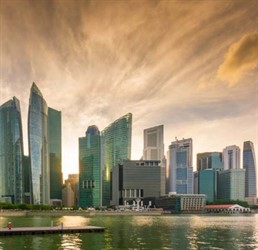
The Challenge
HSE's goal-based and proportionate approach to managing risk in
high hazard industries is of growing interest to governments around
the world, where the UK's regulatory expertise is generally
regarded as exemplary.
Our experience and specialist knowledge of major hazards
regulation and regulatory infrastructure development resulted in
Singapore awarding the HSE International Team a project to review
the regulation, permitting, storage and processing of hazardous
materials by petrochemical facilities based on Jurong Island.
The high hazard potential of these facilities presents a major
risk to Singapore's current and future economy, and HSE's remit was
to provide impartial, expert best practice guidance on the
effective and affordable management of risk, whilst simultaneously
facilitating the ongoing development of Jurong Island's
petrochemical industries as a key contributor to Singapore's
economy.
The Solution
Jurong Island is an industrial zone in Singapore that has a high
density of major hazard installations, including strategically
important refineries and other petrochemical and chemical
industries. The Singapore Economic Development Board (SEDB) asked
HSE to provide detailed advice on new technical guidelines and
criteria for land planning decisions, enabling them to evaluate the
cumulative risk from the various industrial operations in order to
better safeguard the public.
We provided an in-depth analysis of their current criteria and
risk assessment methodologies, comparing this with other approaches
taken across the world. We developed new quantified risk assessment
guidelines and criteria for toxic, flammable and explosive hazards
that allow consistent, proportionate decisions on land use planning
to be taken on a sound scientific basis.
These guidelines were supplemented by substantial guidance
documents and stakeholder meetings with industry and senior figures
from government agencies to support engagement.
The Outcome
The new Quantified Risk Assessment guidelines have been issued,
supporting the management and control of major accident hazard
risks to safeguard the public in Singapore. Following on from this
work, HSE supported Singapore in its move to a UK-style Control of
Major Accident Hazard (COMAH) safety case approach - a growing
trend worldwide. Furthermore, a formal Memorandum of Understanding
with the Ministry of Manpower has been agreed to
enable further cooperation across a wide range of health and
safety topic areas.
"[HSE's Human Factors] lecture was really superb! It really
brought us new insights into accident investigation applying Human
Factors. HSE/UK are really awesome and truly the leader in the
Workplace Safety and Health arena."
Lim Cheong, OSH Inspectorate, Singapore Ministry of Manpower
"We appointed HSE to support us in reviewing Singapore's QRA
guidelines as HSE had the relevant experience and capabilities in
the regulation of health and safety. Although our project with HSE
is still ongoing, HSE has so far demonstrated a strong
understanding of the issues and the context of Singapore's
operating environment. HSE has been responsive, competent and
has provided an excellent level of service."
Singapore Economic Development Board (SEDB)
"HSE has always been very supportive in this project since
the start and this could be seen through the flexibility as well as
the additional efforts HSE has put in all these while".
Alfred Tan, SRMC Officer, Safety & Risk Management Centre,
SEDB
Subsequently, HSE has provided regulatory support to Singapore's
extensive construction sector which, influenced by the good
practice demonstrated during construction works for the 2012
London Olympics, wishes to draw upon and learn from the UK's
experience in this area.
These, and future collaborative health and safety projects, are
beneficial to both Britain's and Singapore's economies.
Furthermore, Singapore's adoption of UK regulatory systems will
make it easier for British businesses, already familiar with
similar regulation, to establish themselves and achieve compliance
in Singapore. This offers mutually beneficial knowledge sharing and
learning experiences, further enhancement of the UK's reputation
for regulatory excellence and economic growth for British
businesses seeking international expansion.
The transfer of HSE's regulatory knowledge and skills,
comparable to that which has benefited Singapore, is already
attracting further commercial opportunities from countries in
Europe, the Middle East and Asia.
For more information on our international work visit our International Leader in Health and
Safety page.
To get in touch with us directly, email Business.Enquiries@hse.gov.uk
This case study was featured on page 43 of the
2017 Annual Science Review.